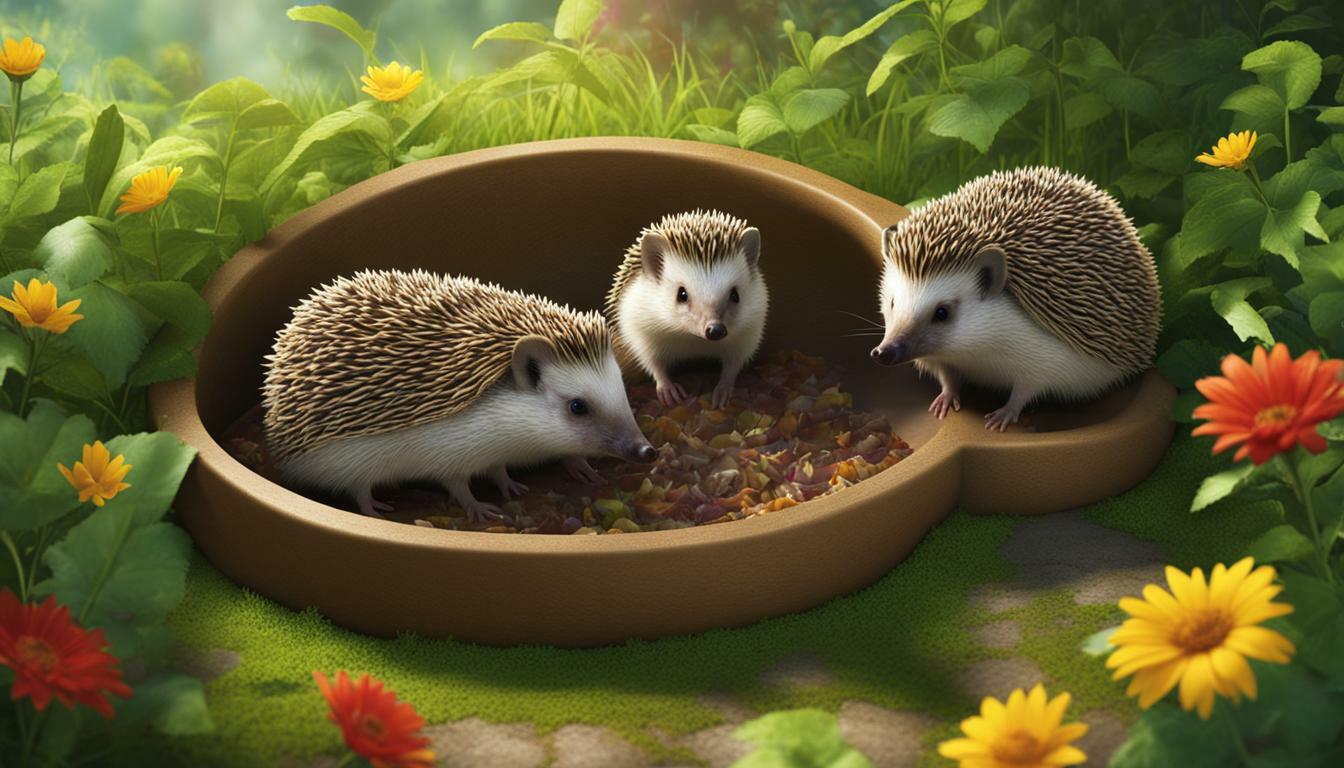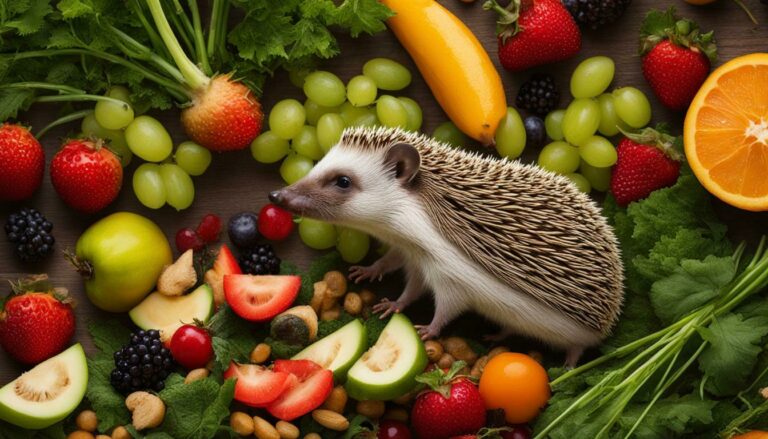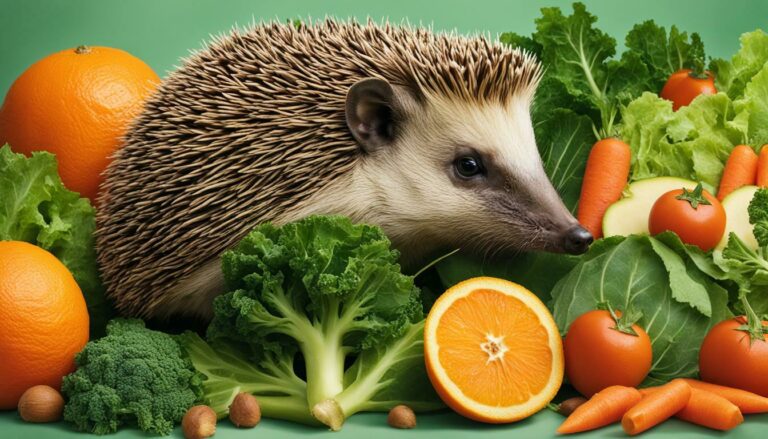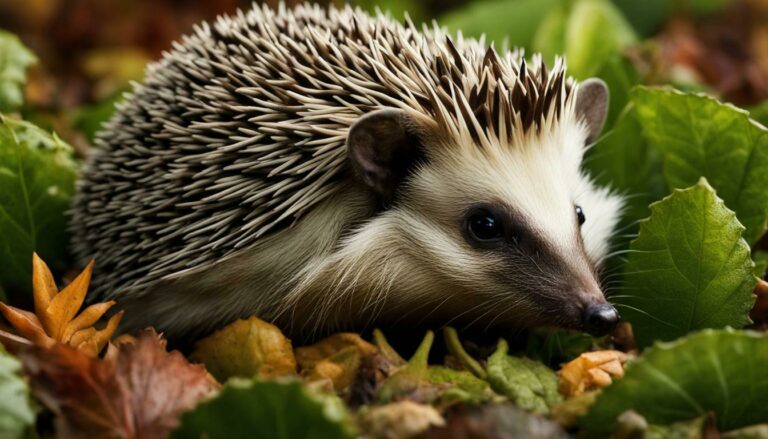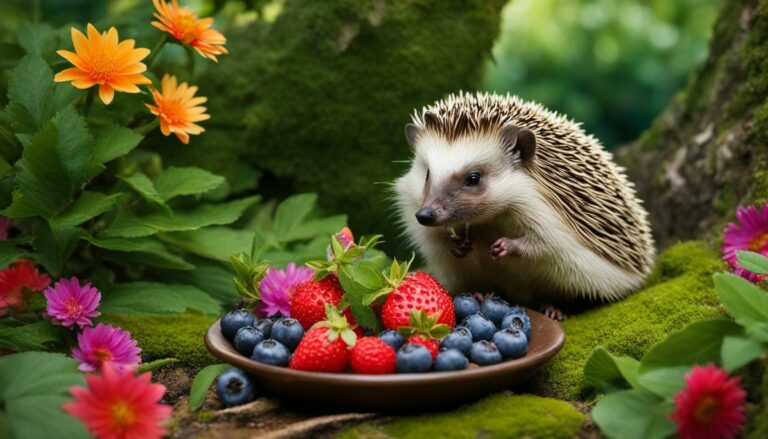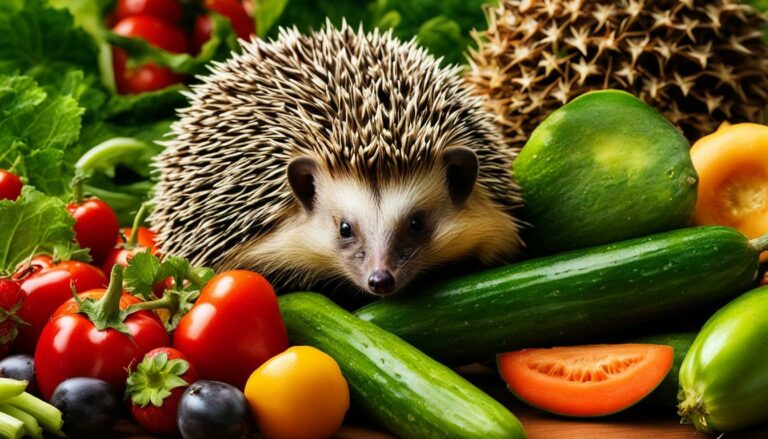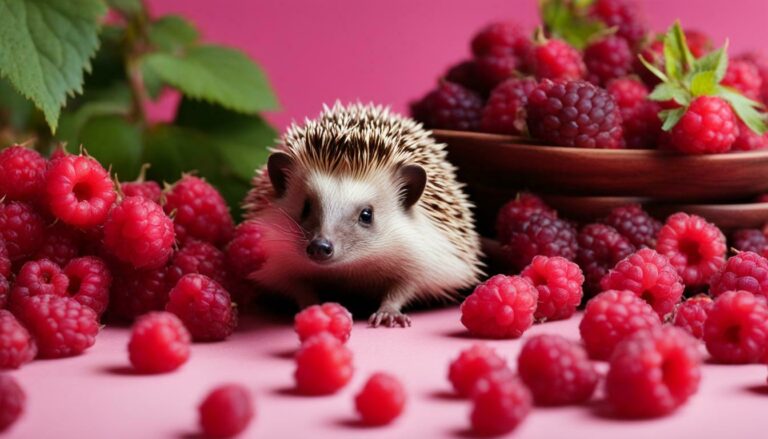Feeding Hedgehogs: Can Hedgehogs Eat Chicken Safely?
Feeding Hedgehogs: Can Hedgehogs Eat Chicken Safely? Hedgehogs have diverse dietary needs, so it’s important to understand what foods are safe and beneficial for them. If you’re wondering whether hedgehogs can safely eat chicken, the answer is yes! Offering lean cuts of properly cooked chicken can be a nutritious addition to their diet.
Key Takeaways:
- Hedgehogs can eat chicken as long as it is lean and properly cooked.
- Avoid fatty cuts of chicken, such as thighs and drumsticks, to prevent obesity.
- Never feed fried or seasoned chicken to hedgehogs.
- Chicken breast is a popular choice for hedgehogs due to its lean and healthy nature.
- Remember to provide a balanced diet for hedgehogs, including commercial hedgehog food and other safe supplemental foods.
Hedgehog Dietary Needs
Understanding the nutritional requirements of hedgehogs starts with examining their natural diet in the wild. Hedgehogs are omnivores and have diverse diets, feasting on a variety of foods such as fruit, fungi, insects, rodents, eggs, and even small reptiles.
When it comes to pet hedgehogs, their diet should be carefully planned to meet their specific needs. A diet high in lean protein is essential for hedgehogs, with protein accounting for 30% to 50% of their diet. They also require low-fat foods, with fat making up only 10% to 20% of their diet. Commercial hedgehog food is formulated to meet these requirements and should be the main component of their diet.
| Nutrient | Requirement |
|---|---|
| Protein | 30% – 50% |
| Fat | 10% – 20% |
In addition to their main diet, hedgehogs can be offered supplemental foods that are safe and nutritionally acceptable. These include properly cooked lean meats such as chicken, turkey, and beef. High-quality canned cat or dog food and treats can also be given as supplements. Additionally, hedgehogs can be offered insects like crickets and mealworms, as well as fruits, vegetables, and leafy greens.
It’s important to consult with a veterinarian who specializes in exotic pets to ensure that your hedgehog’s diet is well-balanced and meets their specific nutritional needs. Fresh, clean water should always be available, and it’s recommended to change the water at least once per day.
Offering Chicken To Your Hedgehog
Lean cuts of cooked chicken can be a suitable addition to a hedgehog’s diet, but it’s important to follow certain guidelines. While hedgehogs should primarily be fed high-quality hedgehog food, lean cuts of properly cooked chicken can be offered as a supplemental food.
When offering chicken to your hedgehog, it’s crucial to choose lean cuts of meat and avoid fattier cuts like thighs and drumsticks. These spiny creatures are prone to obesity, so reducing their intake of fat is essential. Additionally, it’s important to properly cook the chicken to reduce the fat content.
It’s crucial to never offer your hedgehog fried or seasoned chicken. Opt for chicken breast, as it is lean and healthy. Remember that chicken should only be a supplement to their main diet, and other lean meats can also be added for variety.
| Safe Supplemental Foods for Hedgehogs |
|---|
| Properly cooked lean meats |
| High-quality canned cat or dog food |
| High-quality cat treats |
| Cooked eggs |
| Crickets |
| Mealworms |
| Earthworms |
| Waxworms |
| Apples |
| Bananas |
| Beans (cooked or uncooked) |
| Berries |
| Carrots |
| Grapes |
| Leafy greens |
| Peas |
| Pears |
| Tomatoes |
Remember to offer these foods in moderation and always consult with your veterinarian to ensure your hedgehog’s diet is balanced and meets their nutritional needs. By following these guidelines, you can safely incorporate chicken into your hedgehog’s diet and provide them with a variety of nutritious supplemental foods.
Supplemental Foods
In addition to chicken, hedgehogs can be given a variety of other foods to ensure a balanced and nutritious diet. Supplemental foods can provide additional nutrients and variety to their meals. Here are some safe and nutritionally acceptable options:
- Properly cooked lean meats: Other lean meats, such as turkey breast, lean cuts of beef, and game meats like pheasant, can be offered to hedgehogs as a source of protein.
- High-quality canned cat or dog food: This can be given as a treat or mixed with their regular hedgehog food to add variety and flavor.
- High-quality cat treats: Some cat treats can be given occasionally as a special treat, but make sure they do not contain any harmful ingredients.
- Cooked eggs: Eggs can be boiled or scrambled and offered to hedgehogs as a source of protein.
- Crickets, mealworms, earthworms, and waxworms: These insects can be added to the hedgehog’s diet for additional protein and to mimic their natural diet as insectivores.
- Fruits and vegetables: Hedgehogs can be offered small amounts of fruits and vegetables, such as apples, bananas, berries, carrots, grapes, leafy greens, peas, pears, and tomatoes. These should be given in moderation and as occasional treats.
When offering supplemental foods, it is important to consult with a veterinarian who specializes in exotic pets to ensure that the foods are safe and nutritionally appropriate for hedgehogs. They can provide guidance on portion sizes and frequency of offering these foods.
Remember, hedgehogs have specific dietary needs, and their main diet should consist of high-quality hedgehog food that meets their protein and fat requirements. Supplemental foods should only be given in moderation and as a complement to their main diet.
| Supplemental Foods | Description |
|---|---|
| Properly cooked lean meats | Offer other lean meats like turkey breast, lean cuts of beef, and game meats as a source of protein. |
| High-quality canned cat or dog food | Add some high-quality canned cat or dog food to their diet for variety and flavor. |
| High-quality cat treats | Give your hedgehog some high-quality cat treats as an occasional special treat. |
| Cooked eggs | Offer boiled or scrambled eggs for an additional protein source. |
| Crickets, mealworms, earthworms, and waxworms | Add these insects to their diet to mimic their natural insectivorous diet and provide additional protein. |
| Fruits and vegetables | Offer small amounts of fruits and vegetables like apples, bananas, berries, carrots, grapes, leafy greens, peas, pears, and tomatoes as occasional treats. |
Obesity In Hedgehogs
Maintaining a proper diet is crucial for preventing obesity and promoting the overall health and well-being of hedgehogs. Obesity is a common issue in hedgehogs, as these small creatures have a tendency to overeat if not monitored. Just like with humans and other pets, obesity can lead to a range of health problems and shorten the lifespan of hedgehogs.
Hedgehogs are natural foragers and opportunistic eaters in the wild, consuming a diverse diet that includes insects, fruits, vegetables, and even small animals. However, as pets, hedgehogs have less opportunity for natural foraging and may be provided with a more limited diet. It is important for hedgehog owners to carefully monitor their pet’s food intake to prevent excessive weight gain.
To prevent obesity in hedgehogs, it is crucial to provide a proper diet that meets their nutritional needs. Hedgehogs require a diet that is high in lean protein and low in fat. Commercial hedgehog food is specially formulated to meet these requirements and should be the main component of their diet. Supplemental foods, such as cooked chicken and other lean meats, can be offered in moderation.
In addition to maintaining a proper diet, it is important to provide regular exercise for hedgehogs to help prevent obesity. Hedgehogs are naturally active animals, and they should have plenty of opportunities to move around and explore their environment. Providing a large, stimulating enclosure with toys and hiding places can help encourage exercise and prevent boredom.
| Risks of Obesity in Hedgehogs | Prevention and Management Tips |
|---|---|
| Increased risk of diabetes | Monitor food intake and avoid overfeeding |
| Heart problems | Offer a balanced diet and avoid high-fat foods |
| Digestive issues | Provide regular exercise and opportunities for natural foraging |
| Liver problems | Ensure a clean and spacious enclosure for movement |
| Mobility issues | Consult with a veterinarian for dietary recommendations |
| Cancer | Monitor hedgehog’s weight and body condition regularly |
| Shortened longevity | Seek veterinary care if weight gain is a concern |
Conclusion
Preventing obesity is essential for the overall health and well-being of hedgehogs. By providing a proper diet that is high in lean protein and low in fat, monitoring food intake, and promoting regular exercise, hedgehog owners can help their pets maintain a healthy weight and prevent obesity-related health issues. It is important to consult with a veterinarian specializing in exotic pets for specific dietary recommendations and to ensure the best care for your hedgehog.
Conclusion
In conclusion, hedgehogs can safely eat chicken as part of their diet, but it should be offered in moderation and in accordance with their specific nutritional needs. Hedgehogs are omnivores and their natural diet in the wild consists of a diverse range of food, including insects, fruits, fungi, and even small reptiles. However, when kept as pets, their diet should be carefully balanced to ensure they receive all the necessary nutrients for their overall health and well-being.
When offering chicken to hedgehogs, it is important to choose lean cuts of meat that are properly cooked. Chicken breast is a good option as it is low in fat and high in protein, which is essential for hedgehog nutrition. Fattier cuts such as thighs and drumsticks should be avoided to prevent obesity, a common issue in hedgehogs. It is also important to never offer fried or seasoned chicken, as these can be harmful to their health.
While chicken can be a part of a hedgehog’s diet, it should not be the sole source of nutrition. Commercial hedgehog food is formulated to meet their specific dietary needs and should be the main component of their diet. Supplemental foods such as high-quality canned cat or dog food, cooked eggs, insects, and a variety of fruits and vegetables can be offered to provide additional nutrients. It is always recommended to consult with a veterinarian specializing in exotic pets to ensure the proper diet and nutrition for your hedgehog.
Managing obesity is crucial for the overall health of hedgehogs. Obesity can lead to various health issues such as diabetes, heart problems, digestive issues, liver problems, mobility issues, cancer, and shortened lifespan. To prevent obesity, it is important to feed hedgehogs the recommended amounts of food and avoid overfeeding or excessive treats. Regular exercise and providing a stimulating environment can also help in maintaining a healthy weight for your hedgehog.
In summary, while hedgehogs can safely eat chicken, it should be offered in moderation and in combination with a balanced diet that meets their nutritional needs. Lean cuts of properly cooked chicken can provide a good source of protein for hedgehogs. However, it is important to remember that commercial hedgehog food should be the main component of their diet, supplemented with other safe and nutritionally acceptable foods. Consulting with a veterinarian is essential to ensure the optimal diet and well-being of your pet hedgehog.
FAQ
Q: Can hedgehogs eat chicken?
A: Yes, hedgehogs can eat chicken. It is important to offer lean cuts of cooked chicken without seasoning or frying.
Q: What parts of the chicken are safe for hedgehogs to eat?
A: The best parts to feed hedgehogs are skinless chicken breast and drumsticks. Fattier cuts such as thighs and drumsticks should be limited.
Q: How should chicken be prepared for hedgehogs?
A: Chicken should be cooked thoroughly without any seasoning or frying. It should be served in small, manageable pieces to make it easier for hedgehogs to consume.
Q: Can hedgehogs eat other types of meat?
A: Yes, hedgehogs can also eat lean meats such as turkey, pheasant, lean beef, liver, and lamb.
Q: What are the risks of feeding hedgehogs chicken?
A: Raw or undercooked chicken can pose a risk of salmonella infection. Chicken skin and fatty cuts can contribute to obesity in hedgehogs.
Q: How can obesity be prevented in hedgehogs?
A: To prevent obesity, it is important to feed hedgehogs a proper diet with appropriate serving sizes, avoid overfeeding, and limit high-fat foods.
Q: What are the main dietary needs of hedgehogs?
A: Hedgehogs require a diet high in lean protein and low in fat. Commercial hedgehog food is formulated to meet these nutritional needs.
Q: What other foods can be offered as supplements to hedgehogs?
A: Hedgehogs can be supplemented with foods such as high-quality canned cat or dog food, cooked eggs, crickets, mealworms, earthworms, and a variety of fruits and vegetables.
